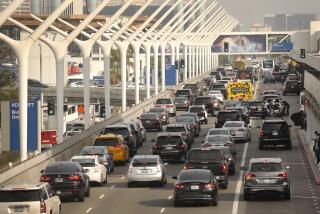L.A.’s commuter dream
- Share via
A new report from the U.S. Census contains a kind of cool comfort: Yes, commute times here are exasperating, but at least Los Angeles is only the 17th worst metropolitan area in the nation for getting to work. According to the 2010 data, residents spent about 28 minutes commuting each way, every day.
Granted, that’s more than the national average of about 25 minutes, but it’s a solid victory over such places as New York, Washington and, believe it or not, Poughkeepsie, N.Y., all of which clocked in at more than 31 minutes. So while Los Angeles residents stew as they merge onto the 101 and the 405, grind their teeth as they come to a standstill on the Santa Monica Freeway or dodge trucks along the Long Beach Freeway, at least there’s the consolation that it’s worse in Poughkeepsie.
Or is it? The American Community Survey numbers capture how long it takes to get to and from work, but they amalgamate the various ways people do it. Commuters in some other areas are whiling away their time on trains and subways. They’re immersed in books, talking with fellow passengers — even, God bless them, reading newspapers. Meanwhile, we’re furtively checking email and hoping that’s not a Highway Patrol officer pulling up behind. It may take New Yorkers an extra six minutes to get to the office, but many get there without having to fight through traffic to do it (although they might have to stand the entire way on the subway).
Some help is on the way for Los Angeles. Measure R, the sales tax measure that voters approved in 2008, is generating revenue for public transportation projects throughout the county. The Orange Line is being extended. Ground has been broken for new “express hot lanes” on freeways. Preliminary engineering is underway on a connector rail and on extending the subway to the Westside. If Congress would approve Mayor Antonio Villaraigosa’s plan to accelerate those projects by advancing money for them and allowing Los Angeles to repay it over time, those plans would move faster still.
Public transportation won’t reduce all travel times, as the census data illustrate. But it will reduce some, even as it cuts down air pollution, relieves traffic congestion and produces a healthier community. It’s slowly coming to Los Angeles, where someday it may just allow the region to drop out of the list of the nation’s 20 worst commutes. It’s OK to dream.
More to Read
Sign up for Essential California
The most important California stories and recommendations in your inbox every morning.
You may occasionally receive promotional content from the Los Angeles Times.










